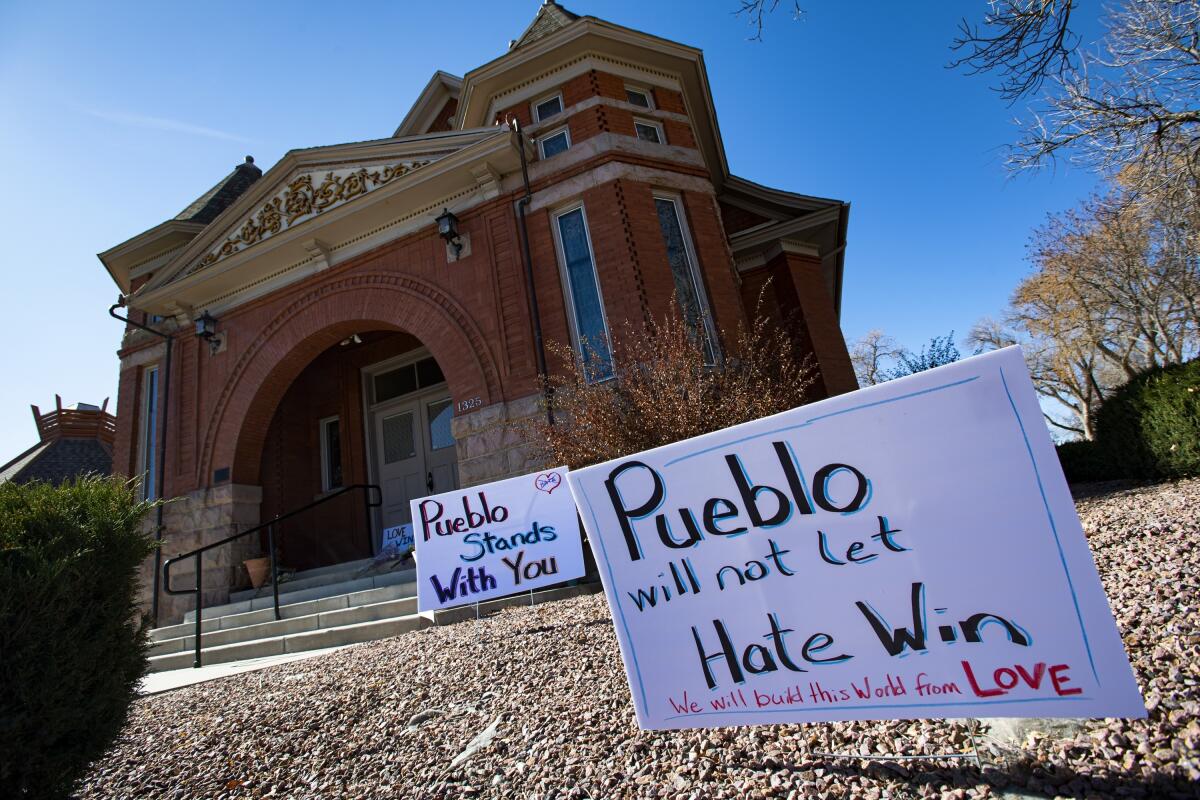How jihadist groups are using the Israel-Hamas war to inspire and recruit lone wolf extremists

- Share via
It didn’t take long after the Hamas attack in Israel on Oct. 7 for terrorist groups to flood the internet with praise for the killings. The next step for entities such as Al Qaeda and Islamic State is to capitalize on raging antisemitism to fuel homegrown violent extremist attacks in the West, perpetrated by lone wolves and small cells of jihadist sympathizers. All cities and nations should be bracing for that.
Despite historical enmity between Hamas and the jihadist groups with broader ambitions, numerous Al Qaeda-linked groups heaped praise upon Hamas, while also taking the opportunity to celebrate the death of Israelis.
Al Qaeda in the Indian Subcontinent, an Al Qaeda offshoot, celebrated the Oct. 7 attack, saying it “exposed the cowardice of Israeli soldiers.” Al Qaeda in the Arabian Peninsula in Yemen praised Hamas’ actions and spoke about the “myth” of Israeli military might, prodding its supporters in the Muslim world to harness the momentum of the attack.
Al Qaeda’s Somalia branch, known as Shabab, released a statement that read: “We salute all the brave heroes, the brave commandos, and all those stationed in the Holy Land.” The group expressed wishes for God to reward the terrorists “for your jihad and your noble deeds.”
But these groups are doing more than just praising Hamas and denigrating Israel. According to FBI Director Christopher Wray, who appeared before the Senate on Tuesday to offer an assessment of the implications of the Israel-Hamas war, “multiple foreign terrorist organizations have called for attacks against Americans and the West,” while Al Qaeda “issued its most specific call to attack the United States in the last five years.” The State Department issued a worldwide travel warning for Americans, noting the “potential for terrorist attacks” abroad “due to increased tensions in various locations around the world.”
Various countries in Europe have already tightened security after a series of incidents linked to Islamist extremism last month, including terrorist attacks in Belgium and France, as well as incidents targeting a synagogue in Germany and the arrest of two Islamic State sympathizers who were recruiting in Italy.
The implications of an increased threat posed by jihadist groups dovetail with a huge increase in antisemitic incidents worldwide, especially in Europe. During the first two weeks of the conflict, there were 76 recorded in Austria and nearly 600 in France. Germany also had a huge spike — a 240% increase in the period after Oct. 7 compared with a year earlier. Police in London confirmed more than 218 antisemitic hate crimes between Oct. 1 and Oct. 18, more than 13 times as many as a year earlier.
The increased threat from jihadist groups is global, but given Europe’s long and sordid history with antisemitism, London, Paris and Berlin warrant especially close scrutiny. Police departments and national authorities should be protecting synagogues and other Jewish sites and should maintain close contact with Jewish leaders and institutions to keep aware of threats and assess their credibility.
As the conflict continues, specific events could spur extremists to action. When Israel is accused (credibly or otherwise) of killing or injuring civilians, this could trigger violent attacks against Jewish targets anywhere in the world. As images of dead and injured civilians in Gaza continue to appear on social media, some jihadist groups are certain to try to use the posts to stir up anger and inspire extremist attacks.
Continued and persistent vigilance is essential, including the monitoring of social networks where threats are the most frequent and overt. It will be crucial for countries to allocate the proper resources to protecting soft targets — which would include mosques as well as synagogues, as far-right extremists motivated by Islamophobia could use the Hamas attack as a pretext to target Muslims.
As the conflict approaches the one-month mark, it shows no signs of abating. And chilling as it is to imagine, the worst may still lie ahead, with a grueling ground war and a mounting civilian toll. That will only fuel jihadist groups and their sympathizers.
Local and national authorities around the world should assume that attacks are being planned. Now is the time to use every counterterrorism strategy available — monitoring online chatter, building relationships in vulnerable communities, bolstering physical defenses at soft targets. None of that will stop the war in Gaza, but it can prevent casualties around the world.
Colin P. Clarke is the director of research at the Soufan Group, an intelligence and security consulting firm in New York City.
More to Read
A cure for the common opinion
Get thought-provoking perspectives with our weekly newsletter.
You may occasionally receive promotional content from the Los Angeles Times.









